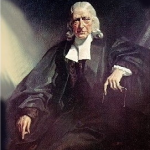John Wesley Did Not Burn His Old Sermons (And Other Things He Never Said)

John Wesley (1703 –1791)
Here is an alleged John Wesley quote frequently encountered on Twitter and on Internet quote sites:
Did John Wesley say (as it is claimed, for example, here):
Once in seven years I burn all my sermons; for it is a shame if I cannot write better sermons now than I did seven years ago.
NO!
He quoted someone else (“a good man” he says) who said this — and then said that he disagreed with this idea!
Now, look. It’s just not reasonable that he advocated this. He published many of his sermons — even ones he no longer fully endorsed! How could he do that if he burned them? He didn’t burn them, and it’s not reasonable to think he advocated doing so!
Here is the relevant entry from John Wesley’s Journal: September 1, 1778:
Tuesday, September 1.—I went to Tiverton. I was musing here on what I heard a good man say long since — “Once in seven years I burn all my sermons; for it is a shame if I cannot write better sermons now than I could seven years ago.” Whatever others can do, I really cannot. I cannot write a better sermon on the Good Steward than I did seven years ago; I cannot write a better on the Great Assize than I did twenty years ago; I cannot write a better on the Use of Money, than I did nearly thirty years ago; nay, I know not that I can write a better on the Circumcision of the Heart than I did five-and-forty years ago. Perhaps, indeed, I may have read five or six hundred books more than I had then, and may know a little more history, or natural philosophy, than I did; but I am not sensible that this has made any essential addition to my knowledge in divinity. Forty years ago I knew and preached every Christian doctrine which I preach now.
So, you see: he said exactly the opposite! He did not advocate burning old sermons, and he did not do it himself.
So, just put those matches away….
And while we are on this topic: there are a lot of false — or, at least, unverifiable — John Wesley quotes that are circulating on the Internet. I especially blame Twitter for spreading these, though you will find them on Internet quote sites (like the one to which I linked above) — generally with no citation of a source where they can be found!
Right. And, for many of them no source can be found.
One of the most common is:
I set myself on fire and people come to watch me burn.
It comes in several other forms like: ““When you set yourself on fire, people love to come and see you burn” and “Catch on fire with enthusiasm and people will come for miles to watch you burn.” That last variation couldn’t possibly be right since the word “enthusiasm” had a different meaning in Wesley’s day. It meant: fanaticism.
No citation is ever given for this quote. And, none can be found. Kevin Watson writes: “…I do have an email from Dr. Richard Heitzenrater that is a response to a query from a Wesley Studies email group that asked about the source of this quote. Heitzenrater basically responded to the email by saying – look for that quote in Wesley as long as you want, you won’t find it.”
Kevin Watson goes on to say:
It troubles me that this quote is so frequently attributed to Wesley, because to me it does not sound like something that Wesley would have said. In the email string that first made me aware of how often this is attributed to Wesley, someone commented that the quote was rather ‘braggadocious’ and as a result did not sound like Wesley. I agree. It would not be characteristic of Wesley to say, ‘I do something awesome, and as a result people come to look at me.’ Wesley’s desire was not to attract people to himself, but to point them to the risen Lord who he believed was their only hope of salvation.
I agree with that assessment. This just doesn’t sound like something John Wesley would say.
Another common one is this:
In essentials, unity; in non-essentials, liberty; and, in all things, charity.
Once again here, I am depending on Kevin Watson, who is himself depending on Richard Heitzenrater’s extensive research of John Wesley’s writings. Kevin writes that Heitzenrater discovered “that a detailed search of Wesley’s word usage found that ‘the saying was not used by Wesley.’”
Let’s see what we can do to stamp out misinformation!
(By the way, here is a link to Kevin M. Watsons’ books on discipleship and the Wesleyan tradition at Amazon: Kevin M. Watson.)













Correct on all accounts. Another is the better known “Do all the good you can, to all the people you can…” etc. Though I sometimes say that such quotations can be appropriately cited as reflecting “Methodist folk wisdom.” Maybe not the one about “I set myself on fire” since it’s so Pelagian. The quotation, “In essentials, unity…” etc. can be attributed to Lutheran theologian Rupertus Meldenius ca. 1618. It is also frequently attributed to seventeenth-century Moravian bishop Jan Amos Comenius, and it was cited with approval by Pope John XXIII in his first encyclical Ad Petri Cathedram (1959).
Yes. Thank you, Ted, for adding that one to the list.
Craig, Kevin, and Ted are all absolutely correct. The internet is awash with false “Wesley quotes,” mostly on United Methodist web sites, unfortunately. The Meldenius quotation was the motto of the 1996 General Conference, spread across the front of the meeting room! I formerly taught at SMU, which has emblazoned in brass on the floor of (now) a Law School building a line from Charles Wesley’s Kingswood hymn for children, cited to John Wesley! And on it goes. These and other Wesley misquotations will comprise a section of my book on Wesley’s sayings, coming soon.
I will look forward to the book!
I never heard that last quote attributed to Wesley. I always thought people attributed it to Augustine. Hey! If no one wants to take credit for it, I will! It’s a great quote. Good article Craig.
Yeah. It’s amazing what has been attributed to Wesley. Thanks.
Consider “Wesley Quotations: excerpts from the writing of John Wesley and other family members.” complied by Betty M. Jarboe (Scarecrow Press 0 London 1990 – ISBN 0-8108-2357-8 – has a great index
Thanks for the recommendation. I actually hadn’t heard of that one.
Here’s an interview I did with Richard Heitzenrater where we discussed his encounters with misinformation associated with Wesley:
https://www.jonathanandersen.com/things-john-wesley-never-said/
Thanks for the link, Jonathan.
Thank you Craig!
I’m glad you appreciated it.
This one can be found in dozens of books and on hundreds of websites, but is bogus:
“I believe in my heart that faith in Jesus Christ can and will lead us beyond an exclusive concern for the well-being of other human beings to the broader concern for the well-being of the birds in our backyards, the fish in our rivers, and every living creature on the face of the earth.”
But at least it is consistent with Wesley’s beliefs and sentiments.
Another common misattribution is:
“What one generation tolerates, the next will embrace.”
That one is not only bogus, but it is contrary to Wesley’s beliefs.
While it is true that Wesley never wrote the precise words, “Do all the good you can. To all the people you can. At all the times you can,” etc., that one is not too far off the mark. He wrote: “Do good. Do all the good thou canst.”